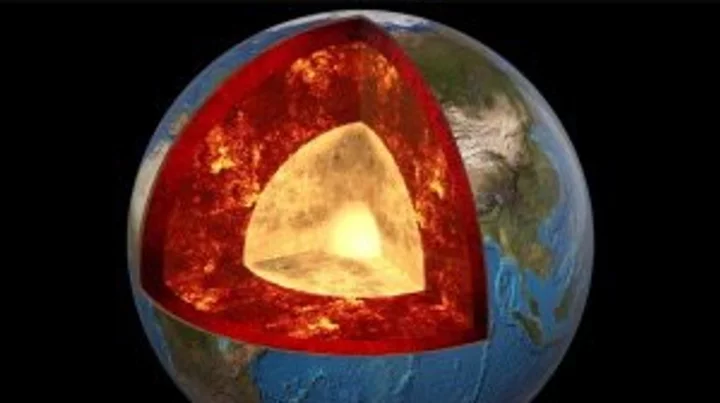
‘It can be hard when your kids leave the nest,’ mother says as study finds parents want their children back
Two-thirds of parents whose children have left home would gladly have them back again. A study with 2,000 mums and dads whose children have left said they would like their children to live no further than 14 miles away from them on average. But 90 per cent were keen to support their child’s dream and let them have their own adventure. As a result, 53 per cent travelled with them for their moving-in day, and 15 per cent stayed in a hotel to ensure they were settled. For 14 per cent of those, this stay ended up being as long as a week to ensure their child was okay. The research was commissioned by Premier Inn, which has created a downloadable ‘Empty Resters’ guide in partnership with content creator and parent, Tracey Lea Sayer, aged 51, to help parents through this change. She said: “It can be hard when your kids leave the nest. “Driving them up to university for the first time, for example, is the last big thing parents get to do for them before they become an adult. ”Our tips cover lots of the issues parents will face when helping kids leave the nest. “From packing advice to making sure kids have essential life skills like how to use a washing machine or plan a food shop, it’s all here. “Helping to focus on practical matters can be really beneficial for parents who might feel overwhelmed with emotion – and it can also really help them feel useful to their kids.” The study also revealed 36 per cent proceeded to redecorate their child’s bedroom after they’d shipped out. But 28 per cent of these simply spruced up the room, making it more comfortable, for when they come back for the holidays. It also emerged kids are slightly more likely to move out and stay local than move a good distance away (57 per cent compared to 41 per cent). And 29 per cent of parents find their children come home weekly. Most kids moved away for university (32 per cent), but 29 per cent moved in with a partner and 10 per cent got their own place with friends. But while 65 per cent would be happy to have their kids move back in with them if needed, 45 per cent said their relationship with their child has improved since they left. However, kids shouldn’t expect a free ride – as 55 per cent of the parents polled, via OnePoll, would be expecting some cash in rent every month. And their child moving out has led to 28 per cent travelling more, 26 per cent having more disposable income and 23 per cent eating out more. ‘A new chapter in her life’ Tracey said her eldest daughter Franke left to go to University last year and said one thing that brought them closer was “preparing her for her university life,” which helped them “bond over the little things that signified a new chapter in her life.” Tracey added: “From the obligatory shopping trip for essential bits and bobs, to teaching her how to make the perfect scrambled eggs and navigate laundry instructions. “Buying essentials in advance made us both feel more prepared, it meant Frankie and I could spend some quality time together too. “Equipped with a checklist of essentials well in advance, the daunting moving-in date had arrived. “Having already familiarised myself with the layout of the city, the location of her accommodation and the proximity of nearby hotels for visits during term time, I found a certain sense of comfort when we arrived in her university city, which is a fair distance from home. “Learning these in advance put my mind to ease and made the moving process a lot smoother.” Here are some top tips from Tracey for parents who are finding it hard after their children moved away: 1. Spend quality time with your other kids: When Frankie left for university, I got to spend real quality time with my younger son. He is quieter and doesn’t need as much attention but now he has me all to himself. 2. Create a New Routine: Establish a new daily routine that fits with your new schedule. Don’t think you will have loads more free time though. The admin that comes with having a child at Uni is relentless. Your ‘To do’ list won’t get any shorter. Student housing, finance and travel all need organising. 3. Focus on Self-Care: Prioritise you for once. Your physical and emotional well-being is important. Try to exercise, eat well and de-stress. 4. Connect with Other Parents: Sharing your experiences can be hugely comforting. I chat to the ladies at my exercise class who are all going through the same thing. We share notes, get it all off our chests and have a right good laugh about all the things the kids are getting up to. 5. Embrace the three Stages: Grief, relief and joy. Of course, you are going to be sad and grieve when your child leaves home, but you will get used to it and weirdly quite quickly. There is a sense of relief once they have settled in and made new friends. It took about three months for it to not feel strange just coming home to the boys Read More Schoolgirls struggle to access basic period protection, research suggests Cost of living means parents have less time to play with children, according to poll When is Freshers’ Week 2023 and how can I make the most of it? Meghan Markle gives children a shoutout as she joins Prince Harry at Invictus Games How many children does Elon Musk have? Single woman’s day in a life video is met with vitriol after going viral
1970-01-01 08:00

How Man Utd can line up without Antony or Jadon Sancho
How Manchester United can line up without Antony and Jadon Sancho in the coming weeks under Erik ten Hag.
1970-01-01 08:00

'Earthquake lights' video seen moments before Morocco tragedy fuel age-old theory
With the tragedy and horror wreaked in Morocco last week, it's unsurprising that people’s focus hasn’t been on the skies. And yet, Friday’s devastating earthquake, has also sparked renewed interest in a mysterious aerial phenomenon. Footage shared to social media just moments before the 6.8-magnitude tremor struck the High Atlas mountains appears to show blinding lights flashing across the sky. Experts have suggested that the jaw-dropping sight is evidence of an enigmatic natural occurrence called “earthquake lights”. Reports of these bright flashes go back centuries. And yet, very little is known about them, to the point that scientists aren’t even sure they’re real. Indeed, some experts have concluded that there isn’t sufficient proof to support their existence, the United States Geological Survey notes. Nevertheless, “people have wondered about them forever," Karen Daniels, a physicist at North Carolina State University, told the New York Times. "It's one of those persistent mysteries that hang around and never quite get nailed." The issue with studying earthquake lights is that since earthquakes are impossible to predict, so are any preceding celestial pyrotechnics. Not knowing when or where they will occur means researchers can’t preemptively install the necessary equipment needed to detect them. Essentially, the only evidence we have comes from eyewitness accounts and, more recently, video recordings. And there is an abundance of the former, with a 2014 study noting that aerial luminous phenomena were reported in relation to 65 earthquakes which occurred in Europe and America over a period of 200 years. These descriptions of earthquake lights vary in their details, with some recalling on-and-of lightning-style flashes, and others minutes-long glows of different colours. “All of these have been reported by observers,” John Ebel, a seismologist at Boston Collegel told the NYT. “Which ones are actually true, and which ones are products of their imagination, we can’t really say.” One theory behind the formation of earthquake lights is that they are the result of friction between tectonic plates generating electricity. However, most experts are unconvinced by this hypothesis, including Dr Daniels. She told the NYT: “Rock on rock is not a situation where people have been able to generate large charge separation. And so it just doesn’t seem like a very good explanation for what people see.” Other scientists have suggested electrical arcing from power lines shaken by earthquakes could be responsible for the sky flares. But Dr Daniels acknowledged it’s still possible that there’s no link at all between the lights and tectonic events. “We’re comforted by things that we can understand, and we’re scared by things we don’t,” she pointed out. “I think that’s part of the reason we’re so fascinated by this phenomenon.” Sign up for our free Indy100 weekly newsletter Have your say in our news democracy. Click the upvote icon at the top of the page to help raise this article through the indy100 rankings.
1970-01-01 08:00

Two ancient humans become astronauts after being blasted into space
Space travel might be a relatively modern phenomenon, but a pair of ancient human ancestors are getting to experience it too – albeit two million years after their death. The remains of a hominin species called Australopithecus sediba which date back two million years have been blasted into space as part of the Virgin Galactic’s spaceship, VSS Unity. The remains of a 250,000-year-old species named Homo naledi was also included in the craft, which was sent into space on September 8. Bone fragments from the two ancient skeletons were taken into orbit by Professor Lee Berger. They reached a height of around 50,000 feet by the VMS Eve mothership before being separated from the VSS Unity spaceship. Berger said: “The journey of these fossils into space represents humankind’s appreciation of the contribution of all of humanity’s ancestors and our ancient relatives. “Without their invention of technologies such as fire and tools, and their contribution to the evolution of the contemporary human mind, such extraordinary endeavors as spaceflight would not have happened.” Berger’s son, Matthew Berger, who was a part of the discovery of the remains as a child went on to explain the significance of the unusual cargo, saying: “These fossils represent individuals who lived and died hundreds of thousands of years ago, yet were individuals who likely gazed up at the stars in wonder, much as we do,” “I imagine they never could have dreamed while alive of taking such an incredible journey as ambassadors of all of humankind’s ancestors.” Sign up for our free Indy100 weekly newsletter Have your say in our news democracy. Click the upvote icon at the top of the page to help raise this article through the indy100 rankings
1970-01-01 08:00

Premier League rumors: Haaland to Barca, Lampard to Lyon, Bowen to Liverpool
Today's Premier League rumors include Erling Haaland surprisingly being linked with Barcelona. Frank Lampard could be the next Olympique Lyonnais manager and Jarrod Bowen is a target for Liverpool.
1970-01-01 08:00

RTÉ director general announces recruitment freeze
All discretionary spending will be stopped in plans to restore confidence in the Irish broadcaster.
1970-01-01 08:00

Vote of no confidence in Irish police chief Harris
A huge majority of association members have voted no confidence in the commissioner.
1970-01-01 08:00

Cast and The La's star John Power announces intimate solo tour
The La's and Cast musician John Power is touring the UK next month.
1970-01-01 08:00

Science news - live: Hidden oceans and moon structures discovered
It feels like this year, more than any other, we’re seeing a stream of science stories that continue to blow our minds. Every day is a school day online in 2023, and a host of studies, research papers and headline-making breakthroughs have completely changed our understanding of the world around us at every turn. There have been missions to the moon and findings about our planet which could turn everything we thought we knew on its head – not to mention baffling hearings on UFOs taking place in the US congress. These are the biggest science stories so far this year that have caught our attention in a big way. 'Alien corpses' unveiled in Mexico divide conspiracy theorists Christmas has come early for UFO watchers, with the alleged corpses of real-life aliens displayed for the world to see. The startling revelation came during a congress hearing in Mexico City on Tuesday, titled the Public Assembly for the Regulation of Unidentified Anomalous Aerial Phenomena (UAP). During the session, which was streamed online, Mexican ufologist Jaime Maussan presented what he claimed were two perfectly preserved “non-human entities”. Read more here. Buy now , Massive ocean discovered beneath the Earth's crust containing more water than on the surface People are only just realising that there’s a massive ocean hidden under the Earth’s crust. It turns out there’s a huge supply of water 400 miles underground stored in rock known as 'ringwoodite'. Scientists previously discovered that water is stored inside mantle rock in a sponge-like state, which isn’t a liquid, solid or a gas, but instead a fourth state. Read more here. Buy now , Sign up for our free Indy100 weekly newsletter Have your say in our news democracy. Click the upvote icon at the top of the page to help raise this article through the indy100 rankings
1970-01-01 08:00

How to Claim $500 in GUARANTEED Bonuses with FanDuel and DraftKings NFL Week 2 Bonus Promos!
FanDuel and DraftKings are rewarding new users who bet at least $10 this week with a guaranteed $400 bonus plus $100 off NFL Sunday Ticket! Find out how to claim each offer here.
1970-01-01 08:00

V&A cares for looted Yemeni funeral stones
The stones were reported by an archaeology enthusiast in an interior design shop.
1970-01-01 08:00

Sitting this many hours a day ‘rapidly increases’ dementia risk, study warns
Adults who spend a large part of their day engaging in sedentary behaviors are more prone to dementia, a new study finds. The research, published on Monday in the journal JAMA, found that people aged 60 and older who spend over 10 hours a day engaging in behaviors like sitting while watching TV or driving could be at increased risk of developing dementia. Scientists, including those from the University of Southern California say, the findings are concerning since Americans on average are sedentary for about 9.5 hours each day. In the study, researchers assessed the data from about 50,000 adults over the age of 60 who had wrist-worn accelerometers to measure their movement for 24 hours per day for a week. The individuals did not have a diagnosis of dementia at the start of the study, scientists noted. They then used a machine-learning algorithm to analyse the dataset of accelerometer readings and classify behaviors based on different intensities of physical activity. Using the AI system, scientists could differentiate between different types of activity and sleeping – providing an objective measure of the time each person spent engaging in different types of sedentary behaviors. After an average of six years of follow-up, researchers used hospital records and death registry data to determine dementia diagnosis, and found 414 participants had the neurological condition. Scientists then adjusted for factors such as age, sex, education level, race/ethnicity, chronic conditions, genetics as well as lifestyle characteristics like physical activity, diet, smoking and alcohol use, self-reported mental health. They found that sedentary behavior was linked with increased risk of dementia among the participants. However, they found that certain amounts of sedentary behavior was not associated with dementia. “We were surprised to find that the risk of dementia begins to rapidly increase after 10 hours spent sedentary each day, regardless of how the sedentary time was accumulated,” study author Gene Alexander from the University of Arizona said. “This suggests that it is the total time spent sedentary that drove the relationship between sedentary behavior and dementia risk, but importantly lower levels of sedentary behavior, up to around 10 hours, were not associated with increased risk,” Dr Alexander added. Researchers call for more studies to establish causality and whether physical activity can mitigate the risk of developing dementia. The findings, according to scientists, “should provide some reassurance to those of us with office jobs that involve prolonged periods of sitting, as long as we limit our total daily time spent sedentary”. Read More What it’s like having Menopause Brain in a millennial office Josh Duhamel and wife Audra Mari announce they’re expecting first baby together Woman warns not to ignore symptoms after hot flushes lead to leukaemia diagnosis Poor metabolic health ‘linked with 12% higher risk of dementia later in life’ Sleeping pill could reduce levels of Alzheimer’s proteins Daily aspirin dose can help prevent diabetes in older people, scientists say
1970-01-01 08:00
